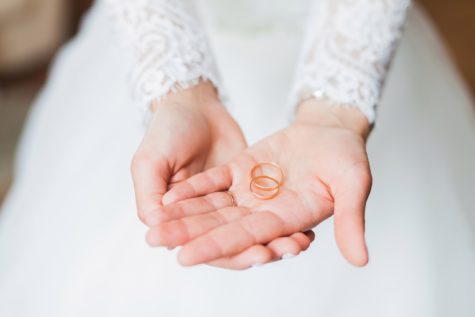RENO, Nevada — What’s in a last name? Muscle, apparently. Men married to women who opt to keep their maiden names after tying the knot are often viewed as less masculine and lacking pants in the relationship, a new study finds.
Researchers at the University of Nevada conducted three related studies in the United States and United Kingdom, hoping to learn how a woman’s decision to keep her last name affected how others perceived her husband.

The researchers’ first two studies found that whenever a husband’s last name differed from that of his wife’s, he was frequently described in ways that both deemphasized his masculinity and overemphasized any feminine characteristics.
Meanwhile, previous research has shown that wives who shun the time-tested naming tradition enjoy a number of benefits, including higher social status and perception of power, along with increased self-focus, ambition, and assertiveness.
These qualities run counter to older, rigid portrayals of women, which depict them as kind and nurturing, yet powerless, the researchers note.
“A woman’s marital surname choice therefore has implications for perceptions of her husband’s instrumentality, expressivity, and the distribution of power in the relationship,” says Rachael Robnett, the study’s lead author, in a journal release. “Our findings indicate that people extrapolate from marital surname choices to make more general inferences about a couple’s gender-typed personality traits.”
Robnett’s third study showed that men who held steadfast beliefs on traditional gender roles showed increased prejudice against husbands who didn’t share their last name with their spouse, seeing him as disempowered.
“We know from prior research that people high in hostile sexism respond negatively to women who violate traditional gender roles,” she explains. “Our findings show that they also apply stereotypes to nontraditional women’s husbands.”
While societal change benefiting women has continued at a steady pace, many feminists still wonder when women will no longer be expected to take on their husband’s surname, which they regard as an obsolete practice.
“The marital surname tradition is more than just a tradition,” Robnett argues. “It reflects subtle gender-role norms and ideologies that often remain unquestioned despite privileging men.”
The researchers published their findings last week in the journal Sex Roles.

Ordinarily I think this is true, but I knew a guy who took his wife’s last name. He had this really long Polish last name, and her last name was Henry. He liked the idea of being known as John Henry, so there are exceptions.
Mine and your post hit about the same time. I’ve seen it once, too.
I played in a band in the early 2000’s that did some weddings.
One wedding reception we played at, the groom (a college professor), had actually taken his wife’s last name.
Yes, I’m serious.
But her dad was absolutely loaded with dough, and the reception was at her parents’ very swank McMansion.
And Daddy paid us good, so whatever…good luck with that, dude..
Not me….
Funny how the icon of feminism (Hitlery) refuse to give up her husband’s name after he cheated on her multiple times.
and how many zillion dollars did we waste finding that out? Sheesh!
Meow….CRACK!!!
Dah?
My wife took my last name but still wears the pants. After 32 years, I don’t give a flying F*&#. She gives me an illusion and I live with that..
This is one more attack upon the family. Insecurity is never a cause for rejecting the latest feminist nonsense. Accepting it might be,
No surprise. I have known many couples where the wife choose not to take the husband’s name. In every case, the husband was a wuss and was henpecked. Most ended in divorce within five-ten years. Most ended childlessness. A few had hyphenated name children, most of whom had parents who were separated by the time the children hit high school. Interestingly not a single man I know who had a wife who kept her maiden name and subsequently divorce married another woman who kept her maiden name – in every case the second wife took the husband;s name. Which goes to show that even wusse’s get tired of being wusses.
That’s because they’re more likely to be liberals. It’s a symptom. “Liberal” is the disease.
“Robnett argues. “It reflects subtle gender-role norms and ideologies that often remain unquestioned despite privileging men.”” – And that’s when I knew Robnett has spent way too much time in the Bubble of Academia and Latte Clutches. Just gross to even read a sentence like that… all Newspeak-y and all.
And husbands that prefer sucking on penis over sex with their wife may be gay.
Someone had to study this?
Does Elsie use Stowell or her maiden name?
Why is the divorce rate so high??? Oh wait
Does he sit when he pees?
The “No Sh8t Sherlock” Study.
I work in a job where I have to call for people by their last names. The hyphenated dual last names some women have are just an assault on the English language. Crunchy, unwieldy, cumbersome, unlovely.
And guess what? Keeping your maiden name means keeping your father’s name. So you are still bowing to convention.
My wife joined my family, so she changed her name. I didn’t take anything from her, she gained something. It was a huge sign of respect to me that I value to this day. She is also a strong and powerful woman despite what some idiots would assume. People should be like libertarians and realize they don’t have the right to care about someone else’s personal decision. Its very liberating… You can do it!!
and tomorrow, we will see a study telling us that water is still wet
In Spain and most Latin American countries the woman has NEVER changed her name. I thought it was an Anglo-Saxon custom. It has always irked me that some men insist on it, I feel like they want to erase their wife’s self. And to be introduced as Mrs Joe Smith is awful, she has been obliterated. Changing the woman’s name is a law only in Hawaii.
If a woman has ALREADY established a successful professional career and a positive, respected, professional reputation under her maiden name, I can understand why she would need to keep her name, regardless of whether or not she wanted to.
Its more of a Christian, and possibly a Jewish tradition/observance/commandment as the bible says; ‘Therefore a man shall leave his father and mother and hold fast to his wife, and the two shall become one flesh.’ So they are no longer two but one flesh. What therefore God has joined together, let not man separate.” mrk10;7-9
Sorta hard to claim you are one when you carry two names.